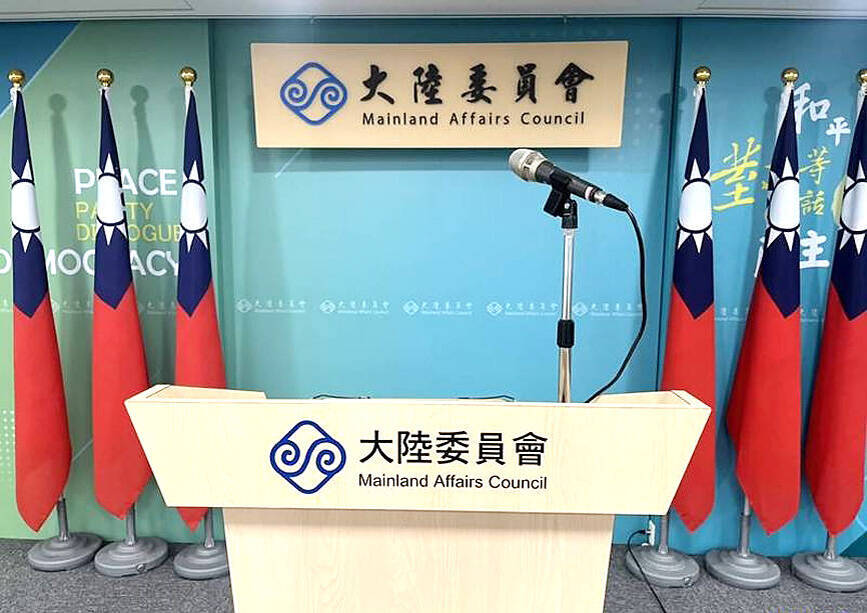The Mainland Affairs Council (MAC) has amended rules for officials visiting China’s special administrative regions in a bid to curb Chinese influence in Taiwan and protect Taiwanese officials, sources said yesterday.
The amendments to the Regulations for Executive Yuan and Affiliated Organizations and Agencies on Visiting Hong Kong or Macau (行政院及所屬各機關(構)人員赴香港或澳門注意事項) would require those visiting either of the two cities for “non-official reasons” to file reports to the government before and after such visits, the sources said.
Those who travel to the cities without reporting could face disciplinary action, they added.

Photo: Taipei Times
In March, President William Lai (賴清德) sought to address China’s “united front” efforts and other national security threats by announcing 17 countermeasures, including a mandatory disclosure system for all central and local government officials participating in exchanges with China.
The MAC also reviewed laws that it said took into account changes in Hong Kong and Macau.
With Beijing tightening its control over the two cities and reducing their autonomy, it is necessary to bolster risk awareness and disclosure requirements to mitigate potential risks to government personnel during visits to those territories, the sources said.
The main points of the revised rules include the addition of mandatory reporting for non-official travel to Hong Kong or Macau, and for meetings or contacts with specific people from those regions, they said.
The council has also updated related forms to enhance risk management, protect government confidentiality and personal safety, and safeguard national interests and security, they added.
The amendments introduce changes to articles 3 and 4 of the regulations, they said, adding that the revisions would be submitted to the Executive Yuan for approval and implementation.
“As the risks of visiting China, Hong Kong and Macau continue to grow, Taiwan will further strengthen its system of managing government personnel,” they said.
The MAC has already requested the support of the Ministry of Civil Service and the Directorate-General of Personnel Administration, they added.
Separately, the MAC has proposed amendments to the Rules Governing the Enforcement of the Public Officials Election and Recall Act (公職選罷法施行細則).
The proposal, which follows discussions between the MAC and the Central Election Commission (CEC) last month, would require candidates for public office to submit a written affidavit declaring that they do not hold household registration in China.
This is to meet the requirements of the Act Governing Relations Between the People of the Taiwan Area and the Mainland Area (臺灣地區與大陸地區人民關係條例), which stipulates that those running for office in Taiwan cannot hold household registration, residency or citizenship in China, the MAC said.
The Ministry of the Interior also suggested that the content of these affidavits be published in the official election bulletin and proposed updates to the candidate registration questionnaire.
The interior ministry’s proposal is facilitated by existing laws requiring the publication of candidates’ personal data in election bulletins, the CEC said, adding that it would use the proposal as a basis for further coordination with the MAC, the interior ministry and other agencies.

Taiwan has received more than US$70 million in royalties as of the end of last year from developing the F-16V jet as countries worldwide purchase or upgrade to this popular model, government and military officials said on Saturday. Taiwan funded the development of the F-16V jet and ended up the sole investor as other countries withdrew from the program. Now the F-16V is increasingly popular and countries must pay Taiwan a percentage in royalties when they purchase new F-16V aircraft or upgrade older F-16 models. The next five years are expected to be the peak for these royalties, with Taiwan potentially earning

STAY IN YOUR LANE: As the US and Israel attack Iran, the ministry has warned China not to overstep by including Taiwanese citizens in its evacuation orders The Ministry of Foreign Affairs (MOFA) yesterday rebuked a statement by China’s embassy in Israel that it would evacuate Taiwanese holders of Chinese travel documents from Israel amid the latter’s escalating conflict with Iran. Tensions have risen across the Middle East in the wake of US and Israeli airstrikes on Iran beginning Saturday. China subsequently issued an evacuation notice for its citizens. In a news release, the Chinese embassy in Israel said holders of “Taiwan compatriot permits (台胞證)” issued to Taiwanese nationals by Chinese authorities for travel to China — could register for evacuation to Egypt. In Taipei, the ministry yesterday said Taiwan

Taiwan is awaiting official notification from the US regarding the status of the Agreement on Reciprocal Trade (ART) after the US Supreme Court ruled US President Donald Trump's global tariffs unconstitutional. Speaking to reporters before a legislative hearing today, Premier Cho Jung-tai (卓榮泰) said that Taiwan's negotiation team remains focused on ensuring that the bilateral trade deal remains intact despite the legal challenge to Trump's tariff policy. "The US has pledged to notify its trade partners once the subsequent administrative and legal processes are finalized, and that certainly includes Taiwan," Cho said when asked about opposition parties’ doubts that the ART was

If China chose to invade Taiwan tomorrow, it would only have to sever three undersea fiber-optic cable clusters to cause a data blackout, Jason Hsu (許毓仁), a senior fellow at the Hudson Institute and former Chinese Nationalist Party (KMT) legislator, told a US security panel yesterday. In a Taiwan contingency, cable disruption would be one of the earliest preinvasion actions and the signal that escalation had begun, he said, adding that Taiwan’s current cable repair capabilities are insufficient. The US-China Economic and Security Review Commission (USCC) yesterday held a hearing on US-China Competition Under the Sea, with Hsu speaking on